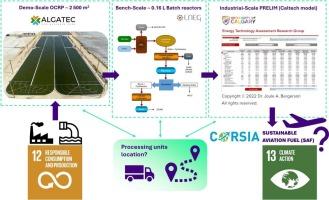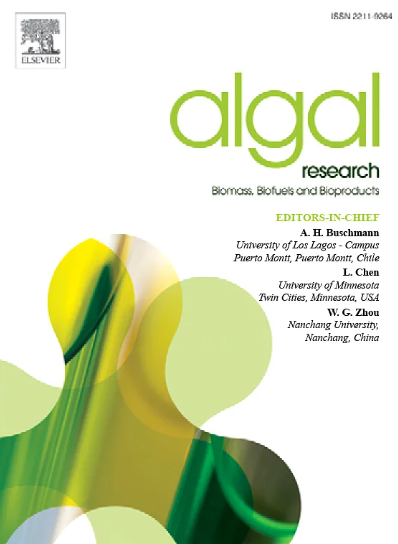Carbon footprint assessment of microalgal biomass production, hydrothermal liquefaction and refining to sustainable aviation fuel (SAF) in mainland Portugal
IF 4.6
2区 生物学
Q1 BIOTECHNOLOGY & APPLIED MICROBIOLOGY
Algal Research-Biomass Biofuels and Bioproducts
Pub Date : 2024-11-15
DOI:10.1016/j.algal.2024.103799
引用次数: 0
Abstract
Industrial liquid effluents (e.g., from fertilizer industry) and flue gas streams (e.g., CO2-rich, from cement industry) arise as an opportunity for waste valorization. Microalgae are suitable biomass for assimilating both effluents at the cultivation stage. Under a biorefinery concept, given the urge for energy transition in the aviation sector, this research explores the transformation of a microalgae consortium grown at an industrial site in Portugal and its subsequent harvesting, hydrothermal liquefaction (HTL), and bio-oil refining. A life cycle assessment (LCA) approach is undertaken with two functional units (FU): 1 kg of microalgae dry-cell weight (dw) and 1 MJ of bio-jet fuel. The latter follows an attributional approach with energy allocation for comparison with the Carbon Offsetting and Reduction Scheme for International Aviation (CORSIA) guidelines. HTL is based on data from bench-scale experiments and literature, whereby the Petroleum Refinery Life Cycle Inventory Model (PRELIM) is used to mimic bio-oil refining. Following this approach, achieving Sustainable Aviation Fuel (SAF) compliance requires net-zero electricity (0 gCO2eq/kWh), with an HTL bio-oil yield of 55.6 % dw (the maximum observed), a minimum refining bio-jet fuel yield of at least 16 %. Alternatively, an HTL bio-oil yield of 36.9 % dw (the median observed) with a refining efficiency of at least 24.3 %.

葡萄牙大陆微藻生物质生产、热液液化和提炼可持续航空燃料(SAF)的碳足迹评估
工业液体废水(如化肥工业产生的废水)和烟道气流(如水泥工业产生的富含二氧化碳的烟道气流)是废物价值化的契机。微藻类是适合在培养阶段吸收这两种废水的生物质。在生物精炼概念下,考虑到航空业能源转型的迫切需求,本研究探讨了葡萄牙工业基地种植的微藻联合体的转化及其后续的收获、水热液化(HTL)和生物油精炼。研究采用生命周期评估(LCA)方法,使用两个功能单位(FU):1 千克微藻干细胞重量(dw)和 1 兆焦耳生物喷气燃料。后者采用能量分配归因法,以便与国际航空碳补偿和减排计划(CORSIA)指南进行比较。HTL 是基于台架规模实验和文献数据,使用石油精炼生命周期清单模型 (PRELIM) 模拟生物油精炼。按照这种方法,实现可持续航空燃料(SAF)合规性要求净零电量(0 gCO2eq/kWh),HTL 生物油产量为 55.6%dw(观察到的最大值),精炼生物喷气燃料的最低产量至少为 16%。或者,热液化生物油干重产量为 36.9%(观察到的中值),精炼效率至少为 24.3%。
本文章由计算机程序翻译,如有差异,请以英文原文为准。
求助全文
约1分钟内获得全文
求助全文
来源期刊

Algal Research-Biomass Biofuels and Bioproducts
BIOTECHNOLOGY & APPLIED MICROBIOLOGY-
CiteScore
9.40
自引率
7.80%
发文量
332
期刊介绍:
Algal Research is an international phycology journal covering all areas of emerging technologies in algae biology, biomass production, cultivation, harvesting, extraction, bioproducts, biorefinery, engineering, and econometrics. Algae is defined to include cyanobacteria, microalgae, and protists and symbionts of interest in biotechnology. The journal publishes original research and reviews for the following scope: algal biology, including but not exclusive to: phylogeny, biodiversity, molecular traits, metabolic regulation, and genetic engineering, algal cultivation, e.g. phototrophic systems, heterotrophic systems, and mixotrophic systems, algal harvesting and extraction systems, biotechnology to convert algal biomass and components into biofuels and bioproducts, e.g., nutraceuticals, pharmaceuticals, animal feed, plastics, etc. algal products and their economic assessment
 求助内容:
求助内容: 应助结果提醒方式:
应助结果提醒方式:


